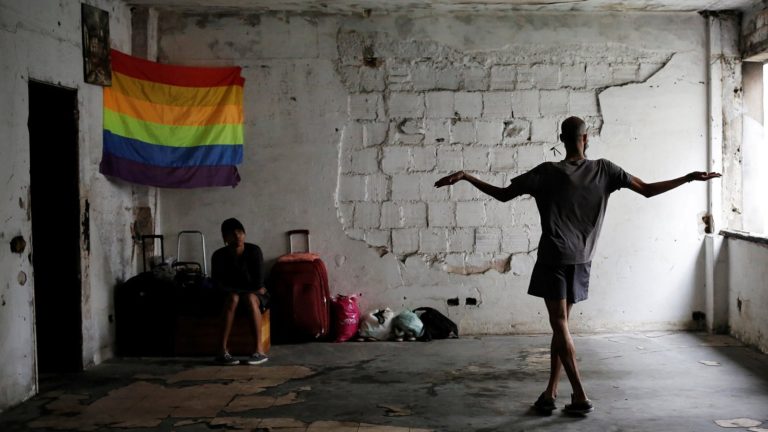

Over the past decade, Latin America has been celebrated globally as a standout in the recognition of LGBTQ+ rights. As early as 2008, the 34 member countries of the Organization of American States unanimously adopted a resolution condemning human rights violations based on sexual orientation and gender identity, and in 2010, Argentina became the tenth country in the world to legalize same-sex marriage. Some of the region’s most populous countries followed suit by enacting similarly progressive laws and collectively advocating for LGBTQ+ protections in international forums.
However, the quest to secure greater protections for LGBTQ+ people in Latin America has lost momentum, raising questions about the likelihood of additional advancements and even the sustainability of the progress made. Backlash from social and religious conservatives and the COVID-19 pandemic have given way to unique challenges facing this vulnerable population. What’s more, some Latin American governments have pursued hostile legal frameworks concerning LGBTQ+ citizens—jeopardizing lives and stonewalling ongoing efforts to expand protections for this community.
More on:
Despite these setbacks, activists and rights groups have continued to organize and educate on behalf of LGBTQ+ rights. And now, with new leadership in Washington, many across the region hope that U.S. partnership can help revitalize their efforts to put an end to violence and discrimination on the basis of sexual orientation, gender identity or expression, and sex characteristics throughout Western Hemisphere.
One Leap Forward, Two Steps Back
Legal recognition of same-sex marriage has stalled in Latin America. After Argentina passed marriage equality, same-sex marriage became legal in Brazil and Uruguay (in 2013) and Colombia (in 2016). This regional progress culminated in a January 2018 landmark ruling, in which the Inter-American Court of Human Rights (IACHR) ruled that parties to the American Convention on Human Rights—more than twenty countries in the hemisphere—are obligated to ensure same-sex marriage rights. Yet since this ruling, only two additional nations in the Americas—Costa Rica and Ecuador—have complied. In Bolivia, the La Paz departmental court granted a single same-sex civil union in December 2020 after a lengthy legal battle, but higher courts have yet to rule on the matter nationwide.
Meanwhile, other governments in the region have placed obstacles in the way of progress, driven by a desire to shore up electoral support and popular approval by courting conservative and religious movements opposed to the expansion of LGBTQ+ rights. Elected officials in Central America are especially beholden to these voting blocs and have failed to put an end to anti-LGBTQ+ persecution. In Guatemala, a congressional commission recently sought to remove the country’s ombudsman for human rights for his statements supporting LGBTQ+ rights and abortion access.
In El Salvador, President Nayib Bukele, despite an earlier pledge to be “on the right side of history” on LGBTQ+ rights, has come out in opposition to marriage equality and discontinued the government’s sexual diversity work. And just last month in Honduras, the legislature approved a constitutional amendment that requires a three-fourths majority to overturn the country’s existing constitutional ban on marriage equality and abortion, making the reforms encouraged by the IACHR ruling increasingly unlikely. Even in Brazil, where the country’s courts have elevated LGBTQ+ issues, President Jair Bolsonaro has fueled social divisions with homophobic rhetoric, prompting rights groups to worry that he will use judicial appointments to chip away at existing laws.
More on:
Pulling Through the Pandemic
The COVID-19 pandemic in Latin America, which represents nearly a third of all deaths attributable to the disease worldwide, has also intensified the stigmatization of LGBTQ+ individuals. LGBTQ+ people already report a higher prevalence of underlying health conditions, but some government policies have heightened the community’s vulnerability, particularly for those who do not identify with their gender assigned at birth. In Peru, Panama, and Colombia, governments have imposed gender-based curfews to combat the spread of the virus, allowing men and women to leave their dwellings on alternate days of the week. For transgender individuals, local laws often make changing their gender on legal documents difficult or impossible.
Consequently, many transgender citizens have been turned away from buying essential goods, received heavy fines, or been arrested for complying with the curfew according to their identified gender. The gender-based restrictions have reportedly contributed to an uptick in violence toward the transgender community, prompting the IACHR to issue a statement urging the Panamanian government to halt such discrimination.
U.S. Leadership: Corralling Regional Consensus
No matter these hurdles, activists across Latin America have continued to fight anti-LGBTQ+ discrimination through legal challenges. But regional cooperation—and even pressure—will be key to advancing their cause. President Biden—who recently announced his administration’s efforts to protect the rights of LGBTQ+ individuals worldwide—can do much to help reinvigorate consensus.
First, the upcoming Summit of the Americas provides an unparalleled opportunity for the new administration to reiterate Biden’s policy to end violence and discrimination on the basis of sexual orientation, gender identity or expression, and sex characteristics. This includes leveraging aid to encourage the implementation of the 2018 IACHR ruling on same-sex marriage.
Second, the U.S. government could use the framework announced in its latest executive order on migration to provide financial and technical assistance to regional civil society organizations that work on behalf of LGBTQ+ individuals who face employment discrimination and legal barriers to accessing services, including unemployment benefits and public health relief during the COVID-19 pandemic.
Third, supporting local judicial officials in the investigation and prosecution of anti-LGBTQ+ hate crimes would raise the profile of the community’s heightened susceptibility to violence. Likewise, U.S. refugee and asylum policy should reflect this reality. The Donald Trump administration gutted refugee quotas and sought to raise barriers for LGBTQ+ asylum seekers. The restoration of previous standards can serve as a lifeline not only to threatened individuals in Latin America but also to others facing danger elsewhere on the globe.